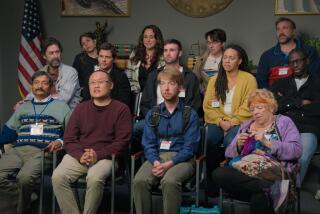Key Changes in Laws : Justice in England Undergoes Stress
- Share via
LONDON — The English legal system, often considered one of the world’s best and the bulwark of democracy in a nation without a written constitution, is under heavy and mounting stress.
Crime is increasing. New legislation is pouring out of Parliament. Judges are being drawn into the political arena as a Conservative Party government uses the law to roll back longstanding trade union protections.
Critics say to take advantage of the law in England, you either have to be poor enough to get state-funded legal aid or rich enough to afford lawyers. With more than a touch of irony, a High Court judge once said British justice is open to all--”like the Ritz Hotel.”
One reason for the high cost of going to court in England is that lawyers come in twos--you hire a solicitor to prepare the case, and he hires a barrister to present the case. Four out of five defendants pleading innocent in criminal cases meet their barristers for the first time on the day of their trial.
The bar is a tightly closed shop, headquartered in the four ancient “Inns of Court” in London, from which Charles Dickens drew material for his novels.
‘Not Logic But Experience’
The English Common Law--the lifeblood of which American Judge Oliver Wendell Holmes termed “not logic but experience”--has grown piecemeal over seven centuries, interpreted by generations of judges and supplemented by libraries full of legislation.
Fully 97% of criminal cases never go before judge and jury. They are heard by unpaid and untrained lay magistrates, who serve for reasons of prestige and out of a sense of service to the community.
The Pilgrims brought the Common Law to the United States, where it forms the basis of the judicial system. Elsewhere, most countries in Western Europe and Latin America rely on Roman law, based more on logic and codes than on judge-interpreted precedents.
But England’s legal system--Scotland has its own--is today on the threshold of reform.
A new act, criticized by civil libertarians, increases police powers to stop, search and arrest; allows detention without charge for up to four days, and changes rules of evidence.
The convention that the spouse of a defendant cannot be called to give evidence has been abolished. Anyone without a permanent address may be liable to arrest.
Increased Vunerability
“It does seem that certain members of society may be arrested for any and all offenses,” say the authors of a guide to the new legislation, Terence Walters and Michel O’Connell. “Those who are already vulnerable seem to be placed at risk even more.”
“The changes are substantial,” said Walters. “Police will need a complete re-education to use these new powers with discretion.”
The government intends to borrow from the Scottish system and introduce an independent prosecution service to take over a job now done by the police.
Proposed legislation will allow the attorney general to appeal against sentences he believes too lenient--not to overturn them but to establish sentencing precedent. Limits will be imposed on the amount of time it takes to bring a case to trial.
The Lord Chancellor, Lord Hailsham, head of the judiciary, has announced plans to review civil law to cut delays, costs and complexities.
Human Rights Convention
Lord Scarman, one of nine senior judges who sit in the House of Lords as an ultimate court of appeal, is seeking to extend the European Human Rights Convention to England and Wales as a bulwark for civil rights.
The judiciary is headed by nine “law lords” in the House of Lords and 18 judges of the court of appeal. Next are 77 High Court judges, chosen exclusively from a coterie of senior barristers called “queen’s counsel” and thus likely to be both elderly and from the same upper-class background.
Then there are 345 circuit judges, a position open to the country’s 44,000 solicitors as well as the 4,800 barristers. In addition, 470 barristers and solicitors serve as part-time “recorders.”
Last year the nation spent $536 million on the administration of justice, in addition to $155 million to run lay magistrates’ courts.
In addition, some 27,000 unpaid magistrates who handle 2 million cases a year are the backbone of the English legal system.
Hefty Powers
After only 40 hours’ instruction, magistrates acquire hefty powers. They can jail people for up to a year and fine them up to $2,200. For some imprisonable offenses, such as assaulting police, there is no right to a jury trial.
The lay justice system dates back to 1361, and in the past was used quite openly to keep the lower classes in their place. Anyone can now apply to become a justice of the peace, but magistrates are commonly accused of being “middle-class, middle-aged and middle-minded.”
Trial by jury in the higher courts has been a feature of English law for 800 years.
In 1670, “12 good men and true” acquitted Quaker preacher William Penn of unlawful assembly, defying a judge who insisted on a guilty verdict.
Penn left for America and founded Pennsylvania. The jurymen, whose “courage and endurance” are honored with a plaque in London’s Central Criminal Court, founded a cardinal point of law: the jury’s word is final.
But although most voters are eligible to become jurors, some question whether the jury system still affords an Englishman a trial by his “peers.”
A Mixture of Races
“The English are no longer a homogenous race,” said the former head of the appeals court, Lord Denning, in a much criticized remark.
“They are white and black, colored and brown. They no longer share the same standards of conduct. Some of them come from countries where bribery and graft are accepted as an integral part of life: and where stealing is a virtue so long as you are not found out.”
There have been several cases of “jury-nobbling,” in which friends of the accused have approached jurors with offers of bribes to give not guilty verdicts, or threats of assault if the prisoner is found guilty. To combat this danger, majority rather than unanimous verdicts were introduced in 1967. At least 10 of the 12 jurors must vote for conviction or acquittal.
In Northern Ireland, the difficulty of finding people willing to risk terrorist threats was given as the reason for emergency regulations suspending the jury system altogether.
Criminal cases in the strife-torn province are held by judges sitting with two professional assessors. Confessions are admitted without corroborating evidence, and in a particularly controversial practice, people have been sent to jail for long terms on the evidence of police informers, known as “supergrasses,” who are given anonymity and amnesty in return for testifying.
Civil liberties campaigner Peter Hain expressed concern in a recent book that methods adopted in Northern Ireland could spread to the mainland.
“We are experiencing an insidious growth of state power, as expressed in the strengthening of the security forces, computerized collection of intelligence, sophisticated techniques made possible by new technology--and above all a tightening of the law, with judges showing an enthusiasm for political trials and for exercising their own political preferences,” he said.
More to Read
Sign up for Essential California
The most important California stories and recommendations in your inbox every morning.
You may occasionally receive promotional content from the Los Angeles Times.













